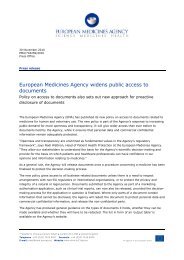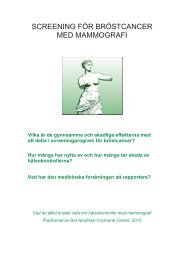1 Selective serotonin reuptake inhibitors (SSRI) â sales, withdrawal ...
1 Selective serotonin reuptake inhibitors (SSRI) â sales, withdrawal ...
1 Selective serotonin reuptake inhibitors (SSRI) â sales, withdrawal ...
Create successful ePaper yourself
Turn your PDF publications into a flip-book with our unique Google optimized e-Paper software.
8. Perspectives<br />
Patient safety is at stake but is up against other interests, particularly commercial ones. Medawar<br />
and Hardon (29) ask if medicines are out of control and they summarize their concerns about<br />
conflicts of interests, pathogenic institutional secrecy, manipulation of data and results about drugs,<br />
ignorance to valuable information from patients about adverse effects, drug promotion through<br />
disease awareness campaigns, and medicines existing in a trade and economic discourse.<br />
Unfortunately, in this scenario it seems difficult to bring patient safety up front.<br />
Advisory and decision making processes related to adverse effects and risk-benefit ratios are mainly<br />
influenced by scientists, experts and public officers in drug agencies. This might not be satisfactory<br />
from a public point of view, as the acceptability of adverse effects and risk-benefit ratios imply a<br />
range of cultural and social implications that might not be included in assessments by health<br />
professionals.<br />
It is modest what is known about citizens' perspective on adverse effects of drugs. This needs<br />
further research.<br />
Drug regulation models based on a precautionary principle or a risk management principle,<br />
respectively, can offer a different focus on patient safety. It has been mentioned that, if a<br />
precautionary principle is chosen, this might have consequences for the pharmaceutical industry´s<br />
willingness to develop new drugs.<br />
There seems to be a problem with the pharmacovigilance system, as it is partly built on the<br />
spontaneous reporting of adverse drug reactions, which are under-reported. For some years, it has<br />
been possible for patients also to report adverse drug reactions directly to the regulators in several<br />
countries. This system might be developed further, as more research is undertaken on this issue.<br />
In the perspective of a risk management model of drug regulation, it is assumed that the risks<br />
associated with the use of a drug can be measured scientifically and that the significance of the risks<br />
can be quantified. It is, however, only the user of the drug who can determine the acceptability of<br />
adverse effects and of the benefit / risk balance.<br />
45





